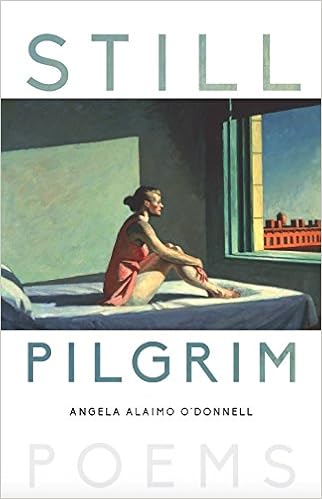
Still
Pilgrim: Poems by Angela Alaimo O’Donnell
There is a kind of distance that you often gauge when I
read poetry, the feeling that you’d like to experience what the poet describes
but you don’t know if you ever will.
Descriptions sometimes fall by the way because they are either too
elevated in nature or too base in feeling, the way a movie can bring together
both elements. Yet, in certain cases,
poems hit one squarely in the heart, because the experiences land so
universally and the emotions too real to forget. Angela Alaimo O’Donnell’s new collection of
poems, Still Pilgrim, captures both
the events of every life and the feelings that flow from them in a beautiful
and captivating way.
In the Still Pilgrim Sings to Her Child Angela pens;
But
you are you, my mystery,
my gray-eyed
boy, my history
Embedded
in your body made of love.
This
the moment I still dream of.
Though
twenty years have come and gone
I
sing to you, and you’re my song.
The
beauty of birth, of bearing a child made from God’s hand is remarkable. There is an awe and mystery to a new life,
and yet after some time, twenty years, the song of a mother becomes a life in
her son, carrying out all her love in his life.
Unmistakable was the birth of our daughter, and I see every day the way
she sings the wonder of her mother, so sweet and so beautiful.
The
legacy of a loved one still lives on in the actions that we do today, and this
is no different than in the poem entitled The Still Pilgrim Makes Dinner.
For
ashes, flour upon my head.
For
prayers, the rise of scented smoke.
My
mother, who is five years dead,
lives
in this meat, these eggs I broke,
This
dish she taught me how to make,
this
wine I drink, this break I break.
It
isn’t even in the emulation of an act once remembered that is so important here
but the memory of a person, so lively and real that you can’t forget their
ways, their demeanor and life. The
little things that our loved ones teach us never pass our gaze because their
person looms larger than the activity itself.
This is the same I remember with my grandma, who would bring life to the
worst of things.
You
don’t want to miss these extraordinary poems by Angela O’Donnell.
Thanks
to Paraclete Press for the copy of this book in exchange for an honest review.
Comments
Post a Comment